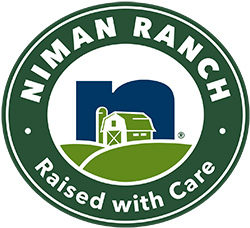WESTMINSTER, COLO. — Natural meat category leader Niman Ranch has released its first impact report, which highlights the company’s leadership in environmental sustainability, humane animal care, farmer support and community impact.
The report includes findings from an independent analysis of Niman Ranch’s farming practices by The Sustainable Food Lab, an organization that helps scale sustainable agriculture in the United States and around the globe.
Through comprehensive surveys, in-depth qualitative interviews and data reviews, the analysis shows that Niman Ranch farms are successfully implementing regenerative practices that build healthy soil, support biodiversity, sequester carbon and reduce runoff.
“The new impact report clearly illustrates how unique Niman Ranch is in the meat sector,” said Chris Oliviero, Niman Ranch’s general manager. “Our founding farmers and ranchers broke the mold when creating this company, aiming to build a new business model that worked for the producers, animals, environment and rural communities. I’m incredibly proud of all that we’ve achieved over the years and the path we have charted for the future.”
The analysis also showed that the company’s model helps spur use of sustainable techniques and approaches including broad adoption of no-till and crop rotation and managing pollinator habitats. Additionally, Niman Ranch farms are using more cover crops than other farms in their area – ten times more than the regional average.
“What we found is a farmer network that already leads in many aspects of regenerative agriculture,” said Elizabeth Reaves, senior program director at the Sustainable Food Lab. “One key difference that stood out in our conversations was the premium pay and stability the program provides farmers, creating a different risk management strategy. Without financial sustainability, it is unlikely that farmers will experiment with new sustainable practices.”
The report also includes a new analysis of the economic impact Niman Ranch farmers have within their community. Conducted by Iowa State University economist Dave Swenson, the data shows Niman Ranch’s significant contributions to the Iowa economy in jobs and labor income. Niman Ranch was found to produce over 150% more jobs across the state than its conventional counterparts and generate more than 50 percent more economic value for the local economy, per 100,000 hogs.
The report also showcases many of the leaders and changemakers from both Niman Ranch’s past and today, including:
- In a piece authored by award-winning journalist Marilyn Noble, four women trailblazers—Phyllis Willis, Dr. Temple Grandin and Diane and Marlene Halverson—are highlighted for their core role in helping Niman Ranch set the highest standards for animal care in the industry.
- The legacy of the late Dave Serfling of Southeast Minnesota, an early Niman Ranch hog farmer, is celebrated for his vision and initial draft of what became the Conservation Stewardship Program (CSP). CSP is the largest federal conservation program in the country and considered a gold standard for a working land conservation program that takes a whole-farm approach.
- Other partners highlighted include Dawn Sherman of Native American Natural Foods, Adrian Lipscombe of 40 Acres & a Mule (page 29) and numerous farmers and ranchers supplying Niman Ranch today.
The report also spotlights new Niman Ranch partnerships and initiatives to support a more sustainable and equitable food system. From advocacy on important animal welfare policies, like California’s Proposition 12, to developing programs and partnerships that support opportunities for BIPOC farmers and culinary leaders, Niman Ranch continues to use its voice and resources for progress.

